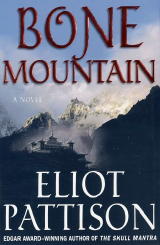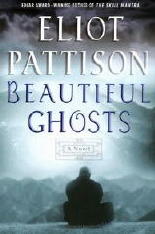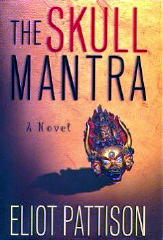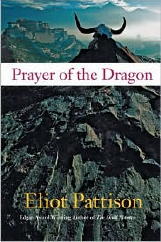Tue 19 Feb 2008
Archived Review: ELIOT PATTISON – Bone Mountain.
Posted by Steve under Authors , Characters , Reviews1 Comment
ELIOT PATTISON – Bone Mountain.
St. Martin’s; trade paperback, May 2004. Hardcover: September 2002.
I don’t know if you’re anything like me, but I’m pretty much intimidated by the sheer bulk of some of the books coming out today. Sometimes, as I’m looking through the stacks of books around here for something to read – and I don’t mean library stacks. I mean stacks – and if a book looks simply too hefty, too weighty, too long – you know what I mean – in terms of what I’m looking for at the time, I usually pass it by and go on to another.

This happens more and more with fantasy epics, by the way, big thick books in series that go on and on forever, and how does one manage to keep track of the story, all of the characters, all of the various strands of the plot, unless you’re living it everyday, just as the author does, or has to, creating it, breathing it, playing scenes back, every free moment, his or her life taken over by nothing but.
But I digress. As I was saying, I don’t recall precisely what the occasion was, but reading this particular book was the result of the decision made one day to give one the “big ones” a try. And it’s a big one, all right, over 400 pages of small print in an oversized trade paperback format. It’s also an introduction to a world that’s familiar to only a smattering of westerners: the land of Tibet, overrun and modernized by the Chinese in the world of today, or at least, under their rule, they’re trying their best to adapt.
Pattison’s first book, The Skull Mantra, won the MWA’s Edgar award for the best first novel of 2000, and it introduced “disgraced ex-Beijing police inspector Shan Tao Yun” to the world of mystery fiction. (I’m quoting from the back cover here.) Bone Mountain is the third of his continuing adventures. Number two was Water Touching Stone, and newly out in hardcover is the fourth, Beautiful Ghosts.
It took me two weeks to polish this one off, and I enjoyed every minute of it. You may have noticed that I have not mentioned anything about the plot, and the reason is that I’ve been putting it off, feeling myself not able to do justice to it.
 The candidate for the most obvious plot line, of which there are several, is that an idol (banned, of course, by the Chinese) is missing a stolen stone eye, and the band of Tibetans, along with one American cowboy (with diplomatic papers, but still a cowboy), with whom Inspector Shan is traveling has as their goal to replace it in its rightful spot in the Yapchi valley.
The candidate for the most obvious plot line, of which there are several, is that an idol (banned, of course, by the Chinese) is missing a stolen stone eye, and the band of Tibetans, along with one American cowboy (with diplomatic papers, but still a cowboy), with whom Inspector Shan is traveling has as their goal to replace it in its rightful spot in the Yapchi valley.
Winslow, the disgraced diplomat, is also on the search for a missing female geologist, part of the oil venture that may soon displace the people of Yapchi valley, which is another essential thread of the tale.
There are several murders to be solved and deaths to be explained, so that, yes, if you were wondering, this is indeed crime (and adventure) fiction.
The real villain, however, is Beijing, and the Chinese government, intent on wiping out, destroying, annihilating an entire culture – that of traditional Tibet – and that, in the longer view, is the story that Pattison is telling, one story that’s now four books long.
There is a sense of timelessness in the world he describes, in the provinces furthest from population centers, and there is along with it a dream-like quality of an ancient civilization that refuses to die in the face of overwhelming and dire adversity. More than once was I reminded of those epic works of fantasy I mentioned earlier, written by authors such as Tolkien and Robert Jordan, among others, but with the essence of reality about it – we do not really know how the story will end – behind the melancholy mask of tragedy.
Not your usual detective story? Not by half!
ADDITIONAL COMMENT: Here’s a news release that’s both relevant and of interest, I’m sure, if you’ve read this far…
For National Release (regional counterparts) May 21, 2004:
Eliot Pattison, writer of the acclaimed Inspector Shan series, has so upset authorities in China that they are periodically blocking access to his website within China. Pattison joins a long list of human rights activists who have been singled out by Beijing for censorship-but he is believed to be the only writer of fiction to be thus censored. Numerous readers in China report that, like a number of sites criticizing the Chinese government, Pattison’s site is often blocked by the central authorities.
Pattison’s award-winning mysteries, set mostly in Tibet, incorporate the Chinese gulag for political prisoners and China’s dismantling of minority cultures into their plots. His books have been highly successful in introducing these issues to new audiences–human rights activists state that his novels capture the realities of China’s treatment of ethnic minorities better than most works of nonfiction. His works have been compared to those of Solzhenitsyn, whose books in an earlier generation brought much-needed attention to the Soviet gulag.

As soon as it was released, Pattison’s first novel The Skull Mantra, became a popular black market item within China as its citizens realized the book explained aspects of their country their government would never speak about. Interest in his books surged after that novel won the prestigious Edgar Award-since then his four novels have been translated into twenty languages and have been adapted to radio drama in Europe. Some editors have suggested that he has created a whole new genre of “campaign thrillers” which construct mysteries around political messages.
Pattison began traveling to China the month that relations between Washington and Beijing were normalized in 1980. On his many repeat visits he became increasingly appalled at the rigid police control of Tibetan temples and other ethnic centers. “After writing several nonfiction books I wanted to try my hand at writing mysteries,” Pattison explains, “and also very much wanted to tell the world about the struggle Tibetans and other minorities face trying to maintain their cultural identity. Writing this series became the perfect answer.” While angered by China’s blocking of his website, he is not surprised-“the list of websites deemed politically undesirable to Beijing numbers in the hundreds,” he notes. “Censorship is a way of life in China, and will have to be addressed if China is truly going to join the global community. At the end of the day, of course, it just underscores the points I make in my books.”
[UPDATE] 02-19-08. There’s not always a reason for going back to my files and picking out a review to run here, but this time there is. This one was written almost four years ago, and unless I’m badly mistaken, no one’s seen it but me until now.
There is now a fifth book in the series, Prayer of the Dragon, out just recently, and on his blog Detectives Without Borders, Peter Rozovsky reviews it and throws out the following question for discussion:

“All this makes Shan Tao Yun more of an outsider than your average cop who’s impatient with his boss. For one thing, Shan’s outsider status is far more dangerous than that of most crime protagonists.
“I’ll stop now and let you go read the books yourselves. […] While you’re on your way to the bookshop or library, ponder this question: Of all the outsider crime-fiction protagonists you know, who is the most outside, the most precarious, the most alienated? What makes him or her that way?”
An interesting question, Peter. My money’s on Inspector Shan, but my knowledge of mysteries taking place all around the world is rather limited, regrettably so. There are some awfully dangerous places a detective can find him- or herself in. I’ll have to wait and see what your readers have to say.
February 21st, 2008 at 2:29 am
Thanks for the plug, which I found only after scanning your chock-full-of-information post (I want to hold off reading it thoroughly until I’ve finished reading “Prayer of the Dragon.”)
I was especially interested to read about the Chinese government’s cracking down on access to Eliot Pattison’s Web site. I always found it curious that book-jacket biographies would say Pattison visits China frequently. I was surprised that such a harsh critic of China’s activities in Tibet would be allowed in.
==============
Detectives Beyond Borders
“Because Murder Is More Fun Away From Home”
http://www.detectivesbeyondborders.blogspot.com/